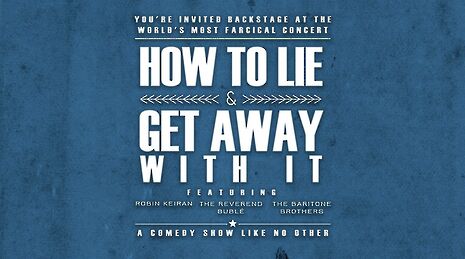Review: How To Lie And Get Away With It
Sam Brown left the Corpus Playroom with mixed feelings about this self-referential farce

Elliott has only one chance to move from her unpaid internship at Amnesia UK into a fully-paid ‘events manager’ position. Her promotion depends solely upon the smooth-running of the charity fundraising concert. In increasingly desperate attempts to keep the concert together, Elliott’s lies become ever more drastic and fragile, leading to a barrage of absurd situations, mistaken identities, dramatic entrances, innuendos, puns, and physical comedy.
At its core, How To Lie And Get Away With It, directed by Ella Godfrey and Simon West, follows a typical backstage farce framework, in the mould of Michael Frayn’s famous Noises Off. However, it is clear from the start that Godfrey and West wanted this to be more than a standard farce. Audience interaction, ironic self-criticism, and a scathing Varsity preview conducted by the show’s fictional journalist all point to a tongue-in-cheek attempt to comment on every critic’s favourite, wearily overused term, ‘meta-theatre’.
"Thoroughly enjoyable, though perhaps not ‘laugh-out-loud’ hilarious"
“I can therefore conclude that this show will be absolutely awful.” Not my words. Rather, those of Eleanor Arga, fictional East-Anglian cultural commentator and journalist, concluding her Varsity preview of a show that she herself features heavily in. As you can see, this play is grounded in meta-theatrical, ironic self-commentary. Arga (played by the excellent Carine Valarche) anticipated the farce would be a “complete and unmitigated failure”. In truth, this light-hearted comedy, which doesn’t take itself particularly seriously, was thoroughly enjoyable, though perhaps not ‘laugh-out-loud’ hilarious.
Absurd situations and deadpan comments are present from the play’s opening. Susanne (Eimear Dooley), the charity owner, delivered her often sarcastic, always witty lines well. “Why are you rubbing yourself against a homeless man?” elicited an early chuckle from the (admittedly small) audience, and set Susanne up as the humorously self-serving and unashamedly greedy stock-character. Indeed, in the spirit of farce, each character was in some way a caricature and Robin (Luke Baines), revelled in his caricature most effortlessly and effectively. Clad in a quite criminal red-chino, checked-shirt combination, Robin was the entitled public schoolboy, the epitome of champagne socialist. In a role that required no subtlety, Baines provided none, instead dynamically and confidently striding around stage, alternating between murmuring, “daddy will pay off the student debt” and proclaiming the democratic “voice of the people!“.
Elliott (Uma Ramachandran) provided a more substantial character, who contrasted well with the multitude of stock-personalities and stereotypes surrounding her. She played the nervous and sensitive twenty-something confidently, and with very few slip-ups. I felt, at points, Ramachandran’s mode of address could have altered away from her slightly hysterical delivery in order to provide some element of variety.
"Ramachandran provided the driving force of the farce"
Yet, in fairness, part of this may have been due to the layout of the Corpus Playroom, where actors have to constantly shift between delivering their lines to each of the very detached segments of audience seating-areas. This requires such constant energy and intensity that changes in tone and register are hard to achieve. Nevertheless, Ramachandran provided the driving force of the farce, much of the comedy arising from the juxtaposition of her relatable personality with the absurd performers of the charity show.
The stage was functional and minimalist. A nice touch was the costume rack on which audience members’ coats and scarfs were hung. As limiting as the small Corpus Playroom is, the cast maximised its potential. Door farce was perhaps limited by the small number of potential entry points, but, again, the directors worked around this, instead focusing on farcical word-play and mistaken identities.
The hilariously named Reverend Bublé (Robin McFarland), a suitably cringeworthy tribute act who speaks in a choice mix of Bible quotations and Bublé references, was an original and interesting addition. While ever-so-slightly predictable, his weaving of lyrics from 'Haven’t Met You Yet’ into a complaint about not getting paid for the charity show was clever script-writing delivered well by McFarland: “I promise you kid, that I’ll give so much more than I get, you just haven’t paid me yet.” Barnaby of the Baritone Brothers (Myles O’Gorman) completes the cast - another reasonably stock character, whose protest song over pay provided a comic highlight.
"Thoroughly enjoyable as long as you don’t think too hard about its scattergun barrage of puns and innuendos"
As a typical farce with a meta-theatrical angle, How To Lie And Get Away With It was thoroughly enjoyable as long as you don’t think too hard about its scattergun barrage of puns and innuendos. However, in its attempts to provide ironic self-commentary on the art of meta-theatre, the play actually forces you to be high-minded and to think critically about the humour and performance. In this complex attempt to mix self-deprecation and light-hearted comedy, it very slightly misses the mark. On that note, I’m just glad that Eleanor Arga is correct in commenting: “You can’t sue for a bad review”
 News / Fitz students face ‘massive invasion of privacy’ over messy rooms23 April 2024
News / Fitz students face ‘massive invasion of privacy’ over messy rooms23 April 2024 Comment / Gown vs town? Local investment plans must remember Cambridge is not just a university24 April 2024
Comment / Gown vs town? Local investment plans must remember Cambridge is not just a university24 April 2024 News / Cambridge University disables comments following Passover post backlash 24 April 2024
News / Cambridge University disables comments following Passover post backlash 24 April 2024 Comment / Does Lucy Cavendish need a billionaire bailout?22 April 2024
Comment / Does Lucy Cavendish need a billionaire bailout?22 April 2024 Interviews / Gender Agenda on building feminist solidarity in Cambridge24 April 2024
Interviews / Gender Agenda on building feminist solidarity in Cambridge24 April 2024





